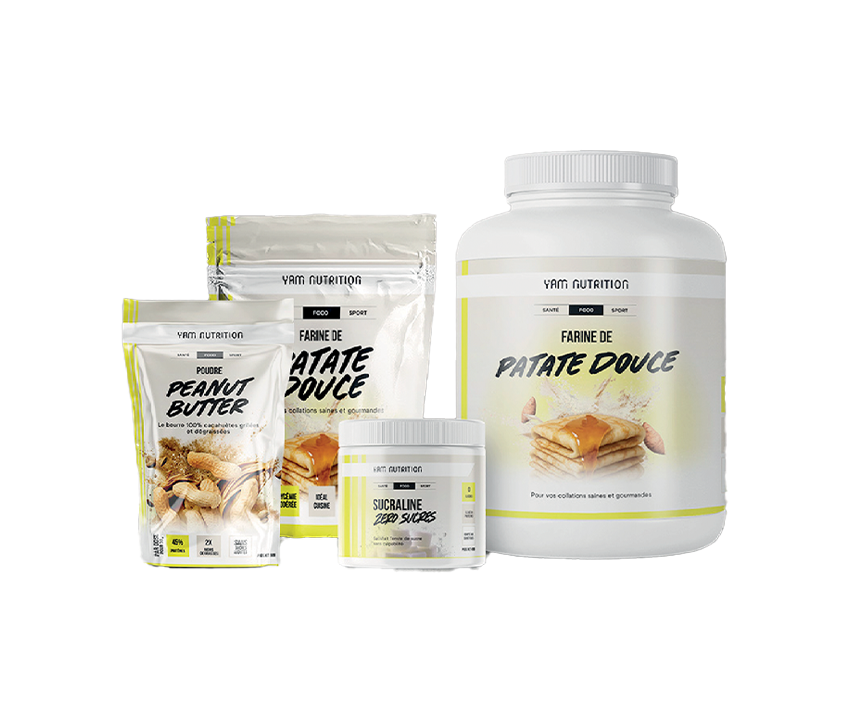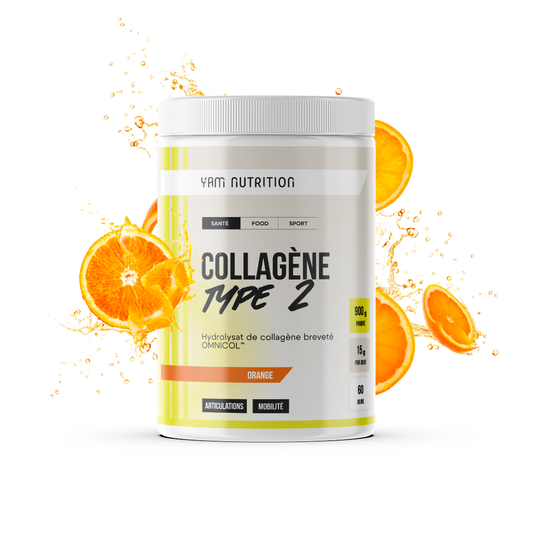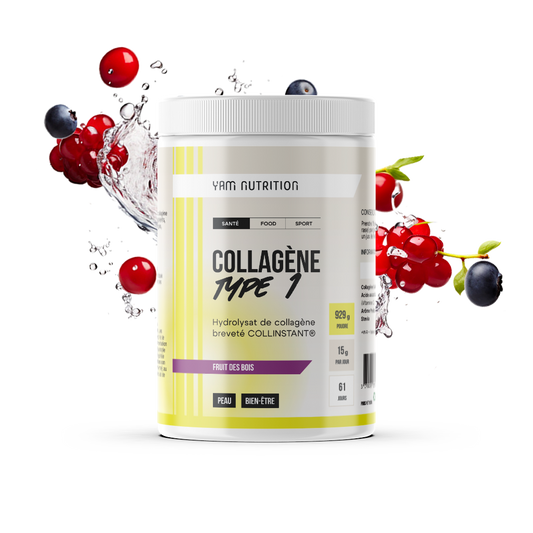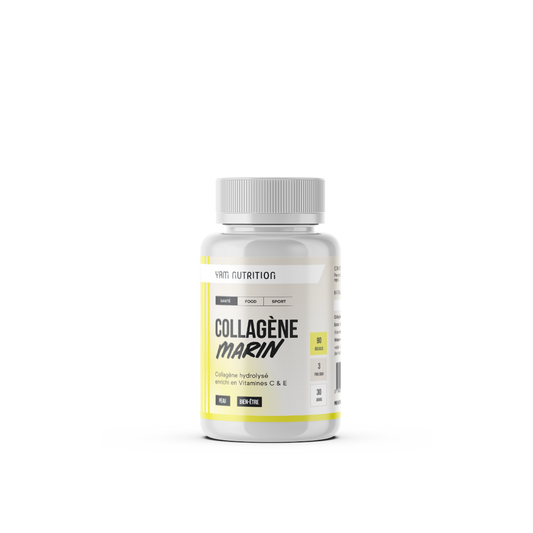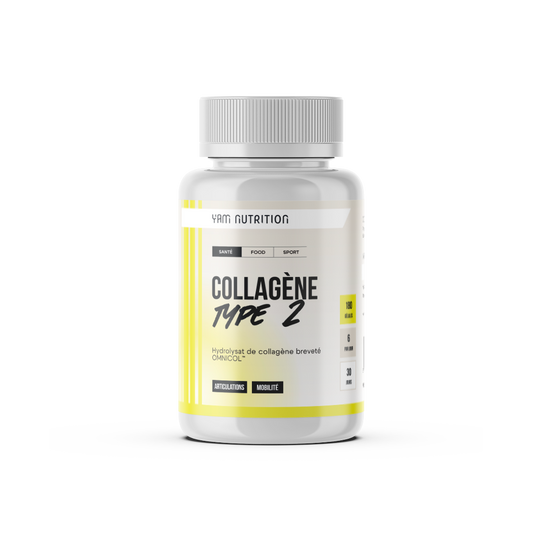Detailed Comparison: Marine Collagen vs. Bovine Collagen

Sommaire
- Reminder of the benefits of collagen for the body
- Types of collagen: marine and bovine
- Bovine collagen
- Marine collagen
- Differences between marine and bovine collagen
- Origin and extraction of bovine and marine collagen protein
- Types of collagen found in fish and beef
- Advantages and disadvantages of marine and bovine collagen
- Effectiveness on the skin
- How much is needed to get visible effects?
- Additional ingredients and safety of use
- How to choose between marine and bovine collagen
- Consider your specific needs…
- Consider dosage differences between bovine and marine collagen
- Choose safe, high-quality products…
- Why is collagen important for your recovery diet?
- Conclusion on bovine and marine collagens
✅ What to remember:
- THE collagen is a key protein for the health of connective tissues, muscles and skin.
- THE marine collagen is more bioavailable and ideal for the skin and the quick recovery .
- THE bovine collagen , rich in types I and III, supports tendons, ligaments and joints .
- For some visible effects , aim 10 to 15g/day and prefer labeled, pure and hydrolyzed products .
The importance of collagen for athletic performance and recovery is well established. This essential protein helps maintain the strength and flexibility of tendons , ligaments and of the skin . This is simply explained since collagen is a Structural protein . It indirectly allows the muscle to contract because each muscle fiber is surrounded by a collagen sheath. However, not all collagen powders are created equal. Choosing between marine and bovine collagen can sometimes be complex. For strength athletes concerned about their health and fitness, this decision is crucial.
OMNICOL™ Patented Collagen Hydrolysate Patented COLLINSTANT® Collagen Hydrolysate Forest Fruits or Mango/Peach Hydrolyzed collagen of marine origin (fish)
Collagen Type 2 Powder
Sale price
49,90 €
Collagen Type 1 Powder
Sale price
49,90 €
Marine Collagen
Sale price
29,90 €
Did you know that the human body contains 28 different types of collagen Each of them plays a specific role in the health of connective and muscle tissues. The different types of this protein are differentiated by the different amino acid chains. (peptides) of which they are composed. On this subject, our article will enlighten you on the fundamental differences between collagen extracted from marine sources and that derived from livestock, in other words, cattle. You will discover the advantages of each type of protein, thus allowing you to choose the dietary supplement best suited to your personal needs and objectives. Ready to dive into the world of structural proteins?
Reminder of the benefits of collagen for the body
Collagen plays a crucial role for athletes because It maintains the strength and flexibility of tendons and ligaments . This essential component of the connective tissue It also contributes to muscle recovery after exercise, which is essential for any active person. Additionally, collagen supports bone and joint health, reducing the risk of injury during training. Collagen is found in a large majority of tissues in the human body .
Thus, consuming collagen-based food supplements could promote the skin suppleness and reduce the visible signs of aging . Collagen peptides also help protect blood vessels and improve blood circulation. Naturally, these benefits are beneficial for endurance and athletic performance. Adopting sustainable nutritional supplementation with bovine or marine collagen could therefore be considered an effective strategy for optimizing athletic results while taking care of your body.
Types of collagen: marine and bovine
Different types of collagen, such as bovine and marine collagen, have different unique characteristics and origins that influence their uses and benefits potentials . A thorough understanding of these two varieties of proteins will allow athletes to select the right dietary supplement for their body requirements and athletic performance goals. Although they both have similarities, this does not exclude some specificities either...
Bovine collagen
Bovine collagen is a popular source of this vital protein, especially among athletes looking to support their joints , tendons and ligaments during and after exercise. Thus, it contributes to muscle recovery after strength or endurance training. With a predominance of type I and type III collagen , collagen from cattle is distinguished by its ability to Improve skin elasticity and bone strength . This form of collagen is sourced primarily from the skin, bones, and connective tissues of cows, making it accessible and abundant for large-scale production without sacrificing the nutritional quality of the protein.
Athletes frequently choose bovine collagen as a dietary supplement because of its high content of amino acids proline and glycine, essential protein elements for repair of connective tissues, ligaments and tendons . Indeed, this protein is particularly appreciated for its ease of integration into the daily diet. We commonly find it in the form of hydrolyzed powder, a format that is easy to dissolve in liquids or mix with other foods, thus facilitating its absorption by the body.
Marine collagen
Extracted from the depths of the sea, marine collagen comes from mostly fish skin and scales . This type of collagen is known for its high content of type I collagen, the same protein found in human skin. Bodybuilding or endurance athletes who would like to preserve elasticity and firmness of their skin can find a powerful ally in marine collagen. Indeed, its structure, similar to that of human collagen, allows for optimal absorption by the body.
Rich in amino acids Glycine , lysine, proline and hydroxyproline, dietary supplements based on this marine collagen also support the synthesis of new proteins. They contribute to tissue regeneration, which is essential for athletes undergoing regular and intensive training. Products derived from marine collagen are also considered more sustainable and environmentally friendly compared to bovine collagen, as they come from a renewable resource.
Differences between marine and bovine collagen
Now, let's break down the key distinctions between marine and bovine collagen to help you make informed choices as an athlete concerned about nutrition and athletic performance. The differences lie not only in their oceanic or terrestrial origin, but also in their molecular structure and how they are absorbed by the body. These are crucial factors when it comes to optimizing muscle recovery and joint health .
Origin and extraction of the protein of bovine and marine collagen
Marine collagen powder is made from fish skin and scales. It is often sourced from sustainable fisheries. This extraction process is environmentally friendly and respects marine life.
To obtain this protein, manufacturers use gentle methods that preserve the nutritional qualities of collagen. Both sedentary individuals and athletes appreciate this type of protein for its purity and natural origin. As for bovine collagen, it is primarily made from the skin, cartilage, and bones of cattle raised primarily for their meat. The manufacturing processes involve strict control over manufacturing processes to ensure high nutritional quality for consumers. Rich in type I and III collagen, these protein powder supplements meet the needs of athletes looking to support their connective tissues, tendons, and ligaments. Now, let's take a closer look at each type of collagen, bovine or marine. Let's explore their specific profiles and potential benefits for the body.
Types of collagen found in fish and beef
Let's move from the origin to the specific composition of each protein... Marine and bovine collagen are distinguished by the types of protein they provide. Marine collagen, often extracted from fish skin and scales, is primarily made up of type I. It is known for its ability to enhance skin elasticity and firmness. This form is ideal for athletes and sedentary people who are concerned about their appearance because it helps reduce visible signs of skin aging such as: wrinkles . As for bovine collagen, types I and III collagen are essential for maintaining muscle structure and strength as well as bone and joint health. Athletes who want to benefit from strengthened connective tissue with improved muscle recovery may consider bovine collagen as a beneficial dietary supplement to their nutritional habits.
Advantages and disadvantages of marine and bovine collagen
From supporting athletes' joints to preserving skin's radiance, choosing between marine and bovine collagen offers distinct advantages and some drawbacks to consider. Each collagen source offers a unique profile of effectiveness and purity, suited to different concerns and lifestyles.
Effectiveness on the skin
Marine collagen is known for its high bioavailability, meaning it's more easily absorbed and utilized by the body. This property makes it a popular choice for athletes looking to strengthen their tendons and ligaments during high-intensity exercise. With a structure similar to human collagen, it effectively contributes to joint strength when heavy loads are used during strength training. The sedentary also appreciate it because it helps reduce the appearance of fine lines and wrinkles, giving the skin a younger and revitalized appearance. Endogenous collagen synthesis decreases with age, but taking marine collagen supplements can help compensate for this deficit.
How much is needed to get visible effects?
How much collagen to consume for fast results is a common question for athletes looking for the best results. The optimal dose of marine or bovine collagen can vary from person to person. To achieve visible improvements, some experts suggest a daily intake of around 10 to 15 grams. This amount can help strengthen connective and joint tissues and maintain skin elasticity. However, athletes looking for faster muscle recovery and strong joints may require higher doses. These doses can reach 15 to 20 grams per day depending on training intensity and desired goals.
Choosing between marine and bovine collagen requires evaluating not only protein needs but also daily routine and exercise type. Most bodybuilders favor bovine collagen for its effectiveness on tendons, muscles, and ligaments, although marine collagen can also be used.
Additional ingredients and safety of use
After considering the amount needed to achieve visible effects, it's equally essential to examine the additional ingredients found in collagen supplements. Athletes should be vigilant about added components that could affect the product's effectiveness or safety. Manufacturers often include vitamins, minerals, or flavorings to enhance the benefits or taste of collagen powder. However, some additives or preservatives can pose health risks or cause unwanted side effects. We know that the vitamin C acts as an enzymatic cofactor in collagen synthesis. This explains why our food supplements provide it, without any other additions. Indeed, an additional intake of zinc or copper, even if they participate in the metabolism of this protein, is questionable.
Choosing a collagen therefore involves carefully reading labels to ensure that the product does not contain harmful or allergenic substances. The purity of marine or bovine collagen could be altered by environmental pollutants, hence the importance of selecting products from reliable and high-quality sources. Certifications such as organic or non-GMO often guarantee better traceability and safety, thus helping to make the best choice in terms of health and athletic performance. Here again, YAM Nutrition has chosen to select labeled and patented forms of collagen, traceable and recognized for their nutritional quality and absence of contaminants.
How to choose between marine and bovine collagen
To improve performance and recovery after training, athletes often turn to the right dietary supplement. To this end, how can you choose between marine and bovine collagen to optimize your athletic results?
Consider your specific needs…
To choose the best form of collagen, bovine or marine, athletes will need to evaluate their personal health and performance goals. While rapid muscle recovery is crucial, some may find marine collagen more suitable due to its high absorption. Furthermore, to strengthen joints after intensive workouts, bovine collagen may be preferable due to its high content of type I and III collagen. Environmental impact and dietary preferences will determine which form of collagen you prefer, depending on your personal values. But what about the dosage differences between these two types of collagen?
Take into account dosage differences between bovine and marine collagen
The dosage differences between marine and bovine collagen are generally minimal. These differences have little impact on overall results. In both cases, bovine and marine, they meet the expectations of athletes who want to achieve optimal connective tissue and muscle recovery. The required dose of bovine or marine collagen can vary for comparable results between the two. Choosing the right collagen for your specific needs also involves evaluating your ability to incorporate the supplement into your daily regimen.
Athletes should ensure that the amount taken will not only be effective but also practical, depending on their schedule and training goals. Furthermore, the source of collagen and its purity are determining factors in choosing a reliable and safe product, thus contributing to the athlete's overall well-being. However, the type of collagen may vary the amount needed. In fact, type 1 and 3 collagen may require grammages of 5 to 15 grams per day to provide maximum benefits, while for type 2 collagen, only a few grams will be necessary for its full effectiveness.
Choose safe, high-quality products…
After considering the dosage of marine and bovine collagen, it's equally crucial to focus on the safety and nutritional quality of your chosen products. Choose collagens that meet high purity standards and are free from harmful contaminants. Check for certificates of analysis and quality seals to ensure you're choosing reliable supplements. Athletes, in particular, should ensure the products they consume have been tested for their absence of banned substances and their ability to support healthy athletic performance.
Why is collagen important for your recovery diet?
It helps repair muscle tissue and maintain strong skin, two essential factors for any athlete. Make sure the collagen you choose is sustainably sourced and has been hydrolyzed, making it more easily absorbed by your body. Don't overlook additional ingredients; opt for those that are natural and beneficial rather than loaded with unnecessary substances or artificial additives. A pure, high-quality product will make all the difference in your journey to a better health and sports performance. If you feel the need, a supplement of wisteria Powdered glycine could also be associated with collagen intake since it is the first amino acid needed to assemble this protein. In addition, glycine is essential for creatine synthesis, allowing you to maintain and gain muscle strength during strength training.
Conclusion on bovine and marine collagens
By evaluating marine and bovine collagen, we discovered that each type of protein offers specific benefits, depending on individual needs, whether for skin, bones, or muscles. Athletes find these collagen proteins valuable for post-exercise recovery and athletic performance. Therefore, it's up to you to consider your personal goals when choosing a supplement. High-quality nutritional products also ensure better absorption and effectiveness. Finally, investing in the right type of collagen can strengthen your overall health, taking a step toward greater well-being in a sustainable way.
Eric MALLET
Spécialiste en Nutrition Sportive
